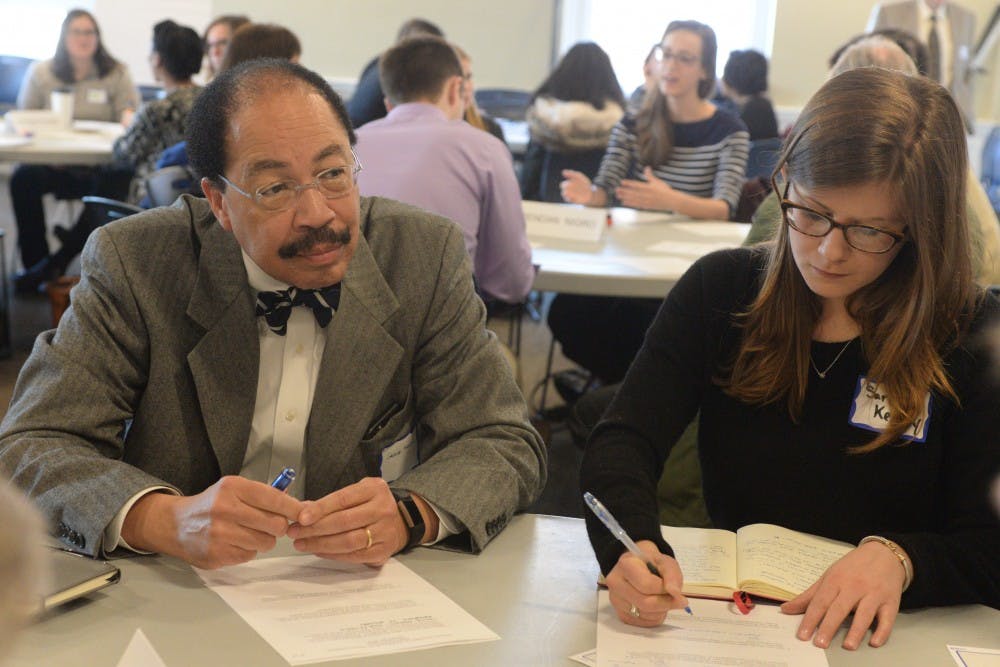The Advisory Committee on the Future of the Historic Landscape held a public input session Friday to help frame recommendations for the Deans Working Group, headed by Law School Dean Risa Goluboff, on the display of the visible historic symbols on Grounds. There were around 50 staff, faculty and students in attendance.
The event was broken into a series of small group discussions before attendees and committee members reconvened to share aspects of the smaller conversations. At least one member of the committee sat at each table to help facilitate discussion and participants were prompted by a series of questions on handouts on each table.
Attiya Latif, a fourth-year College student, student director of the Multicultural Student Center and member of the committee, said she was pleased with the discussion and wants to continue to engage dialogues with members of the community.
“It is really important to continue having these round-table style conversations,” Latif said. “That’s really the only way we’re going to come up with results that are representative of the students and the faculty and the workers and the local Charlottesville community.”
“How can the University’s history be told in innovative and engaging ways?” was one of the central questions the committee encouraged participants to consider.
Graduate Education student Jenny Poole attended the session to listen to others and put forward her own views about the topic. She commented on the complexity of the University’s history, specifically as it relates to Thomas Jefferson.
“I hope we can have an enough honest conversation about Jefferson’s legacy and what that means for the historical landscape in light of his status as a slave owner and the way that people are currently talking about him,” Poole said.
Brendan Nigro, a third-year College student, chair of the University Guides Service and member of the committee, acknowledged the committee’s purpose in responding to the white nationalist rallies of Aug. 11 and 12 and said the aim of the session was to encourage a diverse range of opinions and include multiple voices in the conversation.
“The intention behind this event was to gather the public input, on these pretty important questions,” Nigro said. “In wake of the recent white supremacist rallies in Charlottesville, there was a real impetus towards altering and removing aspects of the historic landscape … We really tried to make an effort to include everyone in our conversation”
The committee was created as a part of the University’s response to the events of August and is under the charge of the Deans Working Group led by Law School Dean Risa Goluboff.
Nigro said the committee is not going to have an executive role or propose specific ideas — instead, the members will create a set of principles the University can refer to.
“We’ll draft principles that the University can use moving forward when they are faced with a tough decision,” Nigro said. “This is not going to be a committee that makes direct recommendations … From there, the Deans Working Group, headed by Dean Goluboff will take those principals and make recommendations.”
John Casteen, a former University president and co-chair of the committee, said in an email to The Cavalier Daily that he found the event was engaging and well attended.
“I left the meeting with the notion that people who want to help with this committee’s work came, and that in fact they did wanted to help,” Casteen said. “Everyone talked and listened, and I think that all of us learned from the conversation.”
Latif said there were a variety of opinions expressed which enhanced the conversation.
“When we were going around the room, there were very different opinions in the beginning and that diversity of opinion actually gave us a better understanding of the issues we had put on paper to talk about,” Latif said.
Latif also said she would like to see more students engaging in these events to ensure the University is doing its best to reflect the views of the wider student body.
“I think the conversations are up here in the clouds but we need to bring them down to the student level,” Latiff said. “Students have to be part of the conversation because they should have a right to have a say in how the University is working and what’s going on in their daily lives and how that is affecting them.”
Lauren LeVan, a fourth-year College student and president of the Asian Student Union, attended the session to voice her concerns and opinions.
“As president of the Asian Student Union, it’s my job to represent my members to the outdoor community,” LeVan said. “I think the first step is showing up, being there, to make sure my voice is heard and my feelings.”
Marie Olavevre, a third-year College student and intern at the LGBTQ center, wanted to ensure there was representation from the LGBTQ community and other minority students. Olavere said she was particularly pleased with the way members of the faculty were taking an active role in being part of the dialogues.
“It was really great to see professionals and administration be so interested in these issues as much as the students are,” Olavevre said. “Having them hearing us when we speak is amazing.”







